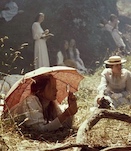 |
|
|
| View previous topic :: View next topic |
| Author |
Message |
sherrife 

Victorian Socialists - people before profit


Joined: 18 Apr 2003
|
| Post subject: The corruption of electoral politics |  |
|
| Quote: | Australian Politics: The Manipulators
By: Mike Clancy
Wednesday 4 July 2007
Indigenous Australians, refugees, asylum seekers, Muslims — minority groups and racial issues have been at the forefront for much of John Howard’s political career, starting in his days as Opposition Leader — when he was widely criticised for his anti-Asian statements.
In taking so many anti-minority positions, Howard’s insight has been to appreciate the potential of people’s fears and resentments.
In his long years in Opposition, Howard saw a range of special interest groups develop around Paul Keating. Howard could not relate to the ideals of the time; to multiculturalism, land rights, equal opportunity, and the Government’s role in promoting these — in his terms — ‘peripheral’ issues. He came to loathe what he saw as this new ‘politically correct’ orthodoxy and believed that the average Australian was just as angry about these issues as he was. Howard understood the underlying fears held by some Australians — fears of the ‘Blacks’ and the ‘Yellow Peril,’ fears of being overrun by hordes from the north. |
Read on at http://www.newmatilda.com//home/articledetail.asp?NewsletterID=324&ArticleID=2337&email=1
This is an interesting article, but I don´t think it goes far enough. It only attacks Howard, and ignores what i feel is a far deeper problem with liberal ´democracies´.
Even through the most minimally ´democratic´ system we currently have in force, the simple act of voting for a representative has allowed people to push forward relatively radical new agendas such as universal suffrage, the rights of women and minorities, etc. These significant recent developments are an obvious (i think) sign that this system is better than anything we have seen before.
However.
Liberal ´democracies´ such as ours encourage passivity, by only requiring us to make a token contribution to the political sphere every 3-5 years. Furthermore, the idea of a paternalistic state is one that actively disempowers people and communities by promising to take care of all their needs. It fails to do this of course, but as it has already weakened our ability to self-organise (as we have invested our trust in the state) we have Katrina´s, Indigenous Australian communities in crisis, wars in foreign countries, and private debt at something like 160% of GDP.
So let me rephrase my earliercomment, this system is better than what we have had so far, but it is still horrible.
Going back to the article now, it makes the perfectly valid point that lobbyists are increasingly ignoring the masses, and turning to crucial swing states in order to win elections. It focuses on Howard, but i would argue this is a far more fundamental problem. It simply makes sense in a electoral paradigm, to focus on those individuals that are in areas where every vote really does matter. By implication, this means ignoring the regions where votes do not (eg. most Indigenous communities).
I think the only way to end the sort of electoral corruption and farcical electioneering increasingly taking place in society is to begin organising horizontally, and proving to ourselves that we can manage (important) things at a grass roots level.
_________________
I would be ashamed to admit that I had risen from the ranks. When I rise it will be with the ranks... - Eugene Debs |
|
|
|
 |
nomadjack


Joined: 27 Apr 2006
Location: Essendon
|
| Post subject: |  |
|
Interesting article Sheriffe. Think he is overplaying the roll of Textor but tend to agree with his analysis and with his conclusion, that the answer lies in having an informed electorate that knows when they are being manipulated and calls the manipulators to account. Not sure I agree about your point concerning lobbyists ignoring the masses. Yes they tend increasingly to focus on swinging voters and marginal seats, but these groups/seats only become critical because they are potentially a part of a larger majority. It's not as though swinging voters decide elections on their own. They swing the result by agreeing with another bloc of voters whose views are quite often set and are thus taken for granted by lobbyists.
Your idea of organising horizontally and managing things at the grass-roots level is interesting, but IMO not an answer to the problems you identify with the democratic process. From my experience, Michels Iron Law of Oligarchy is as applicable to small community-based organisations as it is to large state bureaucracies. The same kinds of people use the same kinds of political machinations, manipulation of prejudices, and in some cases, superior skills, to achieve basically the same kinds of aims as Howard and co - ie getting their own way and imposing their own ideas and ideals, quite often in the belief that they are doing the right thing.
Democracy of any form, whether it be direct, representative, liberal or social is an imperfect form of organisation because it relies on imperfect human beings for it to function. Local government is one of the best examples of this. It is the level of government closest to the community, and the level most accesible to ordinary people, in terms of their capacity to get elected and exert some form of influence. It also provides the worst examples of why ordinary people should perhaps not be let within a bulls roar of political power 
Even with these imperfections though, democracy is still far and away a superior form of political organisation than the alternatives. |
|
|
|
 |
David 

I dare you to try


Joined: 27 Jul 2003
Location: Andromeda
|
| Post subject: |  |
|
Terribly biased article. And what was with the claim at the end that Howard should have 'silenced' Pauline Hanson? I never thought I'd see a writer on the left supporting censorship.
As for the system, obviously it's not perfect. I just don't know that there's a viable alternative. As systems of government go, a vote by the people for representatives is pretty good, but unfortunately one of the side effects of that is that alliances/parties inevitably have to form and thus compete against each other for the people's votes.
I don't understand exactly what you mean in the last paragraph. How would this be applied practically? Which sort of things should be managed by the people?
This topic is certainly relevant and worth discussing. I just wonder if it's a bit of a dream to suggest that any system (at least one that has been used in the history of the world) would be superior to a liberal democracy?
_________________
All watched over by machines of loving grace |
|
|
|
 |
|
|
|
You cannot post new topics in this forum
You cannot reply to topics in this forum
You cannot edit your posts in this forum
You cannot delete your posts in this forum
You cannot vote in polls in this forum
You cannot attach files in this forum
You cannot download files in this forum
|
|



